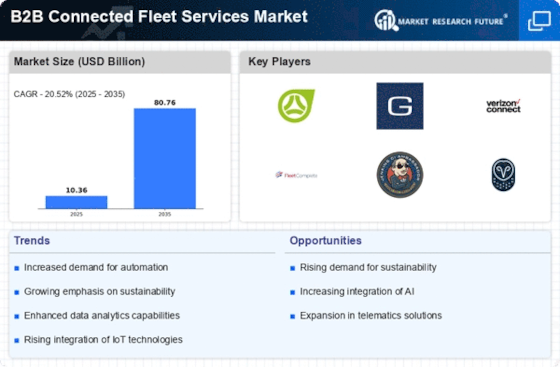Market Trends
Key Emerging Trends in the B2B Connected Fleet Services Market
Fleet management is a multifaceted and intricate process encompassing various aspects, including vehicle monitoring, maintenance, and driver management. For fleet managers overseeing a multitude of vehicles, manually tracking devices or critical metrics can be arduous or even impractical. Traditional methods, relying on legacy processes and tables, persist today, but they often prove imprecise, contribute to downtime, and create communication gaps. A global transformation is underway in the freight and transportation industries, driven by intelligent fleet management solutions harnessing the power of big data, telematics, the cloud, and the Internet of Things (IoT). Beyond the automation of manual tasks, these systems enhance fleet efficiency, productivity, and driver safety, playing a pivotal role in the modernization of fleet management processes.
The growing prevalence of the Internet of Things (IoT) in transportation, logistics, and fleet management is ushering in highly integrated and streamlined solutions. These solutions interconnect in-vehicle sensors and other cohesive digital devices over the Internet, facilitating a seamless flow of data. Sensors installed in transport vehicles and containers continuously collect and process data, enabling real-time actions based on the insights derived. Various digital implementation options are available for IoT in the transportation, logistics, and fleet management sectors, encompassing warehouses, inventories, vehicles, and workforce management.
IoT initiatives leverage technologies such as sensors and RFID chips to transmit critical information, which is then stored in the cloud for future use. This approach is just one of the innovative use cases of IoT, significantly simplifying fleet management for executives. Tracking and receiving real-time updates about freight has streamlined fleet management, addressing concerns such as idle times between routes, traffic conditions, and fuel consumption. IoT development companies have embraced digital IoT technology, leading to improved performance, safety, and enhanced communication with customers over time. This evolution allows executives to make faster decisions in response to customer needs, underscoring the transformative impact of IoT on fleet management.
In summary, fleet management, once a cumbersome and manual process, is undergoing a revolutionary change fueled by intelligent solutions and the integration of IoT technologies. The shift towards automation, data-driven insights, and real-time monitoring not only enhances operational efficiency but also contributes to improved safety and decision-making for fleet managers. As IoT continues to advance in these industries, the trajectory of fleet management is poised for ongoing innovation and optimization, providing executives with the tools they need to navigate an increasingly complex and dynamic transportation landscape.



















Leave a Comment